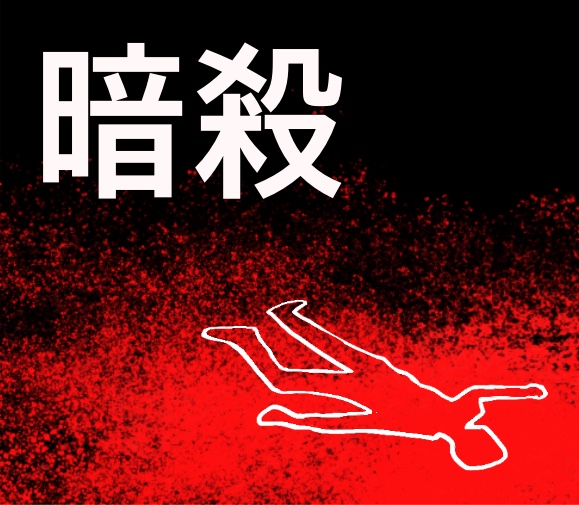September 7, 2022
Word Wise: 暗殺について
朝倉和子著
 安倍元総理が銃撃で亡くなり、ひと月がたった。この驚愕のニュースについて、日本のメディアが「暗殺」と言わないことに若干の雑音があったが、議論にはならなかった。自分だったら「殺害」または「銃撃」と呼び、やはり「暗殺」はなじまない。救急に当たった奈良県立医大病院の担当医の当日記者会見と、その後の司法解剖の監察医の発表とが異なることが大きな原因だが、この事件には弾道・弾丸・死因にさまざまな疑惑が残されており、ひと月たった今も捜査中だし、時代にとって重要な政治家だった人の殺害であるにもかかわらず、公式発表もない。銃撃犯が単独犯と確定していないことも理由の一つで、もし政治的背景を持った狙撃犯が別にいるなら、まちがいなく「暗殺」と呼ぶだろう。
安倍元総理が銃撃で亡くなり、ひと月がたった。この驚愕のニュースについて、日本のメディアが「暗殺」と言わないことに若干の雑音があったが、議論にはならなかった。自分だったら「殺害」または「銃撃」と呼び、やはり「暗殺」はなじまない。救急に当たった奈良県立医大病院の担当医の当日記者会見と、その後の司法解剖の監察医の発表とが異なることが大きな原因だが、この事件には弾道・弾丸・死因にさまざまな疑惑が残されており、ひと月たった今も捜査中だし、時代にとって重要な政治家だった人の殺害であるにもかかわらず、公式発表もない。銃撃犯が単独犯と確定していないことも理由の一つで、もし政治的背景を持った狙撃犯が別にいるなら、まちがいなく「暗殺」と呼ぶだろう。
では、「暗殺」という日本語がなぜなじまないのか考えてみたい。英語の「assassination」にどのような語感があるのか、ぜひみなさんにお聞きしたいところだが、「暗殺」には「暗」という字が含まれていて、これがどろどろした深い背景の闇や謀略とともに、人に隠れてひっそり殺される場面も想起させる。たとえばリンカーン、伊藤博文、ケネディなどは公衆の面前で明らかに「顕殺」されたが文句なしに「暗殺」だ。しかし、山上のような個人的怨みをこじらせた犯罪は、むしろ通り魔的衝動殺人に近い。「暗殺」は大半の辞書には「政治的、宗教的」動機からの殺害と記されており、山上の犯行はそのいずれにも属さない。
因みに「暗」と「顕」は、中国武術において内側からの見えない「気」で相手を倒す技と、表に見える物理的破壊の技との対比で使われる。
日本のメディアはこの事件を統一教会とつなげたいようだが、私の見解では、安倍氏を殺したのは山上(あるいは共犯者)であって、統一教会ではない。意識的か無意識的かは別として、メディアが「暗殺」と言いたがらないのは、事件の性格と、日本語の「暗殺」という言葉の持つ含意が原因と思われる。みなさんはどうお考えですか?
About Ansatsu
By Asakura Kazuko
Since former prime minister Abe Shinzo was shot and died on July 8, we have noticed that the Japanese media have not used the term "assassination" when reporting on the shocking news, and no issue has been made of the matter. I myself would use the word satsugai (killed) or jūgeki (shot), but not feel comfortable calling it ansatsu. All sorts of questions remain about the incident, mainly because of discrepancies about the line of fire, the bullets, and the cause of death in the information provided at the press conference held by the doctor in charge of Abe’s care after he was brought by ambulance to the Nara Medical University Hospital and the announcement made by the medical examiner following the official autopsy. Investigations have continued for more than a month, and yet no official announcement has been made about the killing of one of the most important politicians of our time. One reason for the delay is that whether the killer was acting on his own has not yet been established, but if a separate killer with some political motive were to be found, it would definitely be called "ansatsu."
The reason that the word ansatsu does not seem appropriate with regard to this incident is rather interesting. While I am curious as to what sort of connotations are evoked for readers by the word “assassination,” ansatsu 暗殺 includes the character 暗 an (kurai; dark). It is used when there is some murky or undisclosed background or conspiracy surrounding a killing or when someone is killed out of sight or in secret. The murders of Abraham Lincoln, Itō Hirobumi, and John Kennedy, for example, took place in broad daylight before crowds. There is no doubt that they were ansatsu (assassination), even though I would be tempted to describe them as 顕殺 (kensatsu; my neologism), in that they may have involved some attempt to cover up nefarious doings. A crime committed by an individual like Yamagami Tetsuya, who was bent on exacting personal revenge, seems closer to a wanton killing. Most dictionaries define ansatsu as killing with “political or religious motives,” and Yamagami’s motive does not fit into either category.
The characters for an (暗) and ken (顕), by the way, are used in Chinese martial arts when describing techniques, respectively, for defeating an opponent using the invisible power of ki (気; Ch. qi) and by use of visible physical force.
The Japanese media appear intent on connecting the shooting of Abe to the Unification Church, but it seems to me that it was Yamagami (or an accomplice) who killed Abe, not the Unification Church. Whether consciously or unconsciously, then, the avoidance of the word ansatsu by the media is consistent with the nature of the incident and the connotations of the Japanese word. What do you think?
(Translation by LER and AK; illustration by Stuart Ayre)
Of related interest: http://https://www.japantimes.co.jp/life/2022/07/22/language/shocking-incident-provides-unexpected-language-lesson/

Comments:
There are no comments for this article yet.
Add your comment:
If you are a SWET member, log in to post a comment immediately. Comments are moderated for non-members.